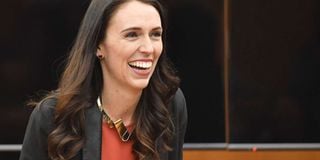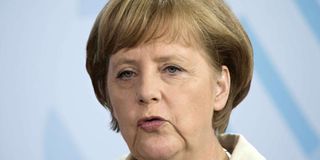Study: Female leaders fought Covid-19 better

New Zealand Prime Minister Jacinda Ardernook is credited for her early action to shut down tourism and impose a month-long lockdown on the entire country, limiting coronavirus casualties to just four deaths.
What you need to know:
- Study shows that women-led countries “systematically and significantly did better” in Covid-19 outcomes compared to those led by men.
- New Zealand Prime Minister Jacinda Ardernook shut down tourism and imposed a month-long lockdown on the entire country.
- In Iceland, Prime Minister Ms Katrín Jakobsdóttir has offered free tests to all citizens.
- In Taiwan, President Tsai Ing-wen’s early intervention measures helped the country in controlling the coronavirus pandemic successfully.
- Male-led countries like the US, Italy, Brazil, and the UK have recorded far higher death tolls than female-led countries.
Germany, New Zealand, Denmark, Finland and Taiwan have one thing in common – they are led by women.
And as the world continues to struggle to contain the spread of Covid-19, these countries seem to be out of the woods. A new study now shows that countries led by women have handled the Covid-19 pandemic better compared to those led by men.
According to the study, the women-led countries “systematically and significantly did better” in Covid-19 outcomes compared to those led by men.
The women leaders are credited with locking down earlier, which led to their countries suffering half as many deaths on average as those led by their male colleagues.
Coordinated policy
The study that analysed 194 countries and published by the Centre for Economic Policy Research and the World Economic Forum, shows the difference between countries led by men and those led by women is real.
This, the study says, may be explained by the proactive and coordinated policy responses” adopted by female leaders who reacted more quickly and decisively in the face of potential fatalities.
They locked down their countries earlier than male counterparts in similar circumstances, which helped these countries save lives, as evidenced by the significantly lower number of deaths in these countries.
A recent study from the University of Pretoria and Trinity College Dublin found that countries with female Heads of State suffered six times fewer confirmed coronavirus deaths than countries led by men.

Germany Chancellor Angela Merkel has been praised for a response that saw the country contract far fewer cases than its European neighbours.
Germany Chancellor Angela Merkel is credited with overseeing the largest-scale coronavirus testing program in Europe, conducting 350,000 tests each week, detecting the virus early enough to isolate and treat patients effectively.
Germany, with 83 million citizens currently has 229,700 active cases, 203,900 recoveries and only 9,314 deaths, making the country’s death rate emanating from the Covid-19 pandemic far lower than most other European countries.
New Zealand Prime Minister Jacinda Ardernook is credited for her early action to shut down tourism and impose a month-long lockdown on the entire country, limiting coronavirus casualties to just four deaths.
Free tests
She imposed a lockdown long before cases began to spin out of control saying on March 15, it was time to "go hard and go early."
In Taiwan, President Tsai Ing-wen’s early intervention measures helped the country in controlling the coronavirus pandemic successfully compared to her neighbours.
As a result, the country turned into exporting millions of face masks to help the European Union and other countries contain the spread of the deadly virus.
In Iceland, Prime Minister Ms Katrín Jakobsdóttir has offered free tests to all citizens.
The Conversation, an outlets that publish news stories written by academics and researchers, in May reported that resilience, pragmatism, benevolence, trust in collective common sense, mutual aid and humility are mentioned as common features of the success of these women leaders.
Effective leaders
In June 2020, former Democratic presidential nominee Hillary Clinton said there was a correlation between women-led countries and positive responses to the coronavirus.
Male-led countries like the US, Italy, Brazil, and the UK have recorded far higher death tolls than female-led countries.
The male leaders have struggled to contain the spread of the disease in these and other countries.
The argument that women make for more compassionate, effective leaders has grown in popularity during the pandemic, as many male leaders face criticism for taking unneeded risks.
Of the 194 countries studied in the paper titled "Leading the Fight Against the Pandemic: Does Gender 'Really' Matter?" 19 had female leaders. Data used in the paper spanned from the start of the pandemic in those countries until May 18.
After the outbreak of the pandemic early this year, a section of world leading gender and health researchers and crusaders called on governments to involve women more in the fight against the Covid-19.
Involve women
Wellcome Trust director Jeremy Farrar and 3D Program for Girls and Women Executive Director Geeta Rao Gupta, indicated that there is need to involve women to achieve maximum results.
In an article published by the World Economic Forum (WEF), the crusaders say women comprise the majority of frontline healthcare workers globally, making their representation vital in tackling the coronavirus crisis.
Female Foreign Affairs ministers across Africa recently called for increased gender perspectives and women leadership in the continent’s strategy against Covid-19.
In a communique released after a virtual meeting between Foreign Affairs ministers of eight African countries including Kenya, the ministers challenged the African Union (AU) to mainstream gender perspectives in its strategies, calling for specific measures focusing on women and girls in ensuring their rights, safety and wellbeing are protected.
The leaders also asked countries to reinforce women’s platforms such as the African Women Leaders Network and the Network of African Women in Conflict Prevention and Mediation to address the gaps that lead to invisibility and disenfranchisement of women, girls, youth and children.





